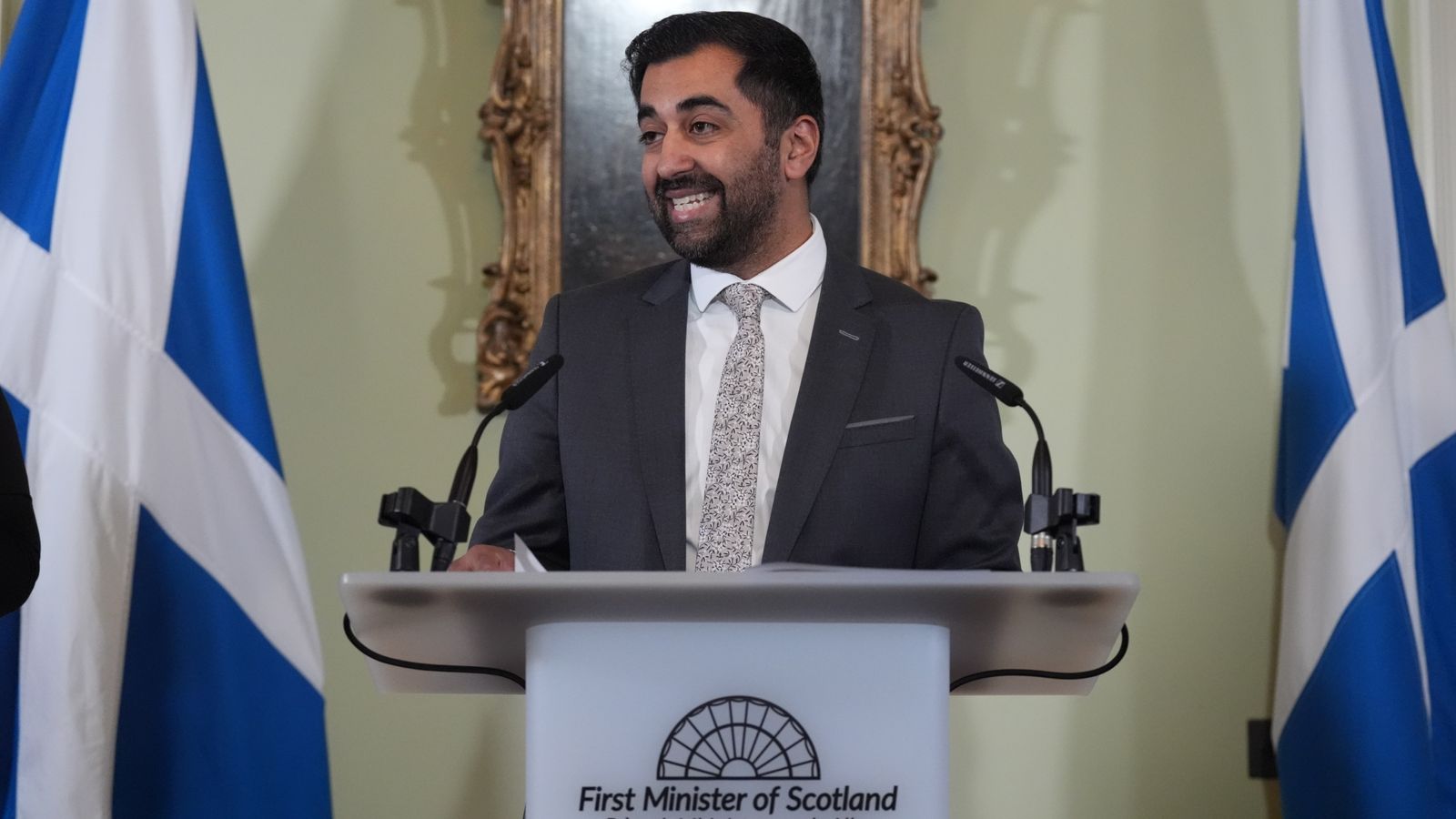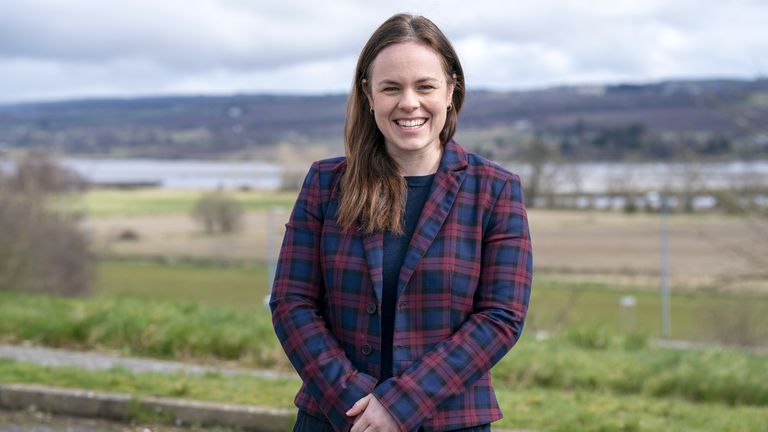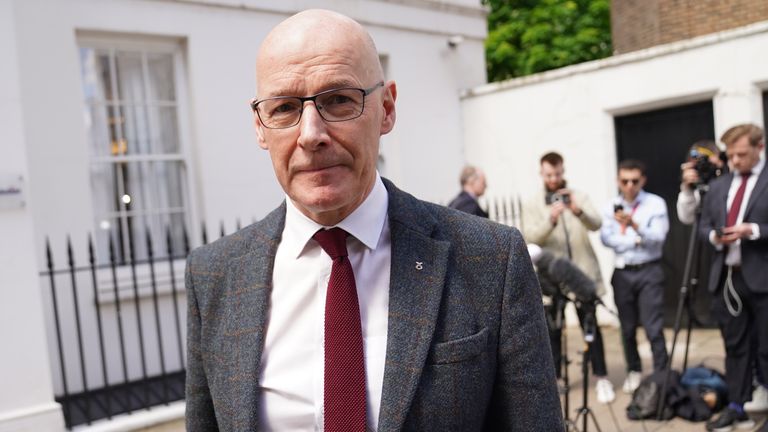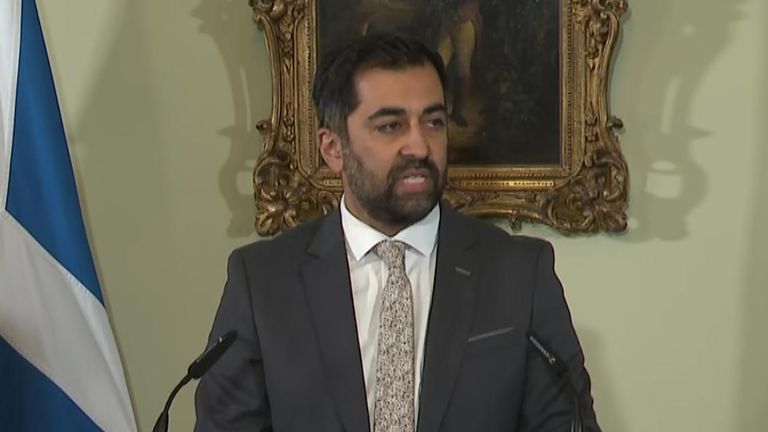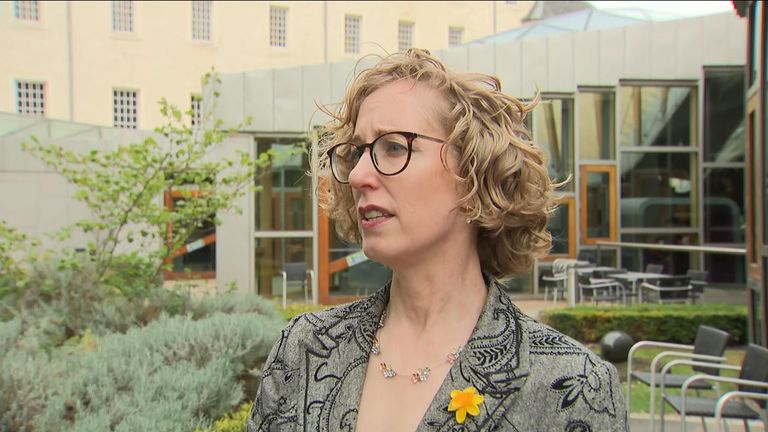What a week in politics – and it’s only Tuesday.
It’s the morning after Humza Yousaf sensationally announced he was stepping down as Scotland’s first minister and SNP leader after little more than a year in the hot seat.
It came as Mr Yousaf faced two votes of no confidence in the Scottish parliament following his decision to terminate the Bute House Agreement with the Scottish Greens.
Mr Yousaf intends to remain in the roles until his successor is announced. The SNP is now accepting nominations, which will close at noon on Monday 6 May.
Last year’s leadership contest to replace former first minister Nicola Sturgeon was bruising for the SNP with then candidates Mr Yousaf, Kate Forbes and Ash Regan trading blows during lively televised debates.
It looks like Ms Forbes is getting ready for round two with a source close to the former finance secretary telling Sky News she is “actively considering” entering the race again.
Meanwhile, John Swinney said he is giving “very careful consideration” to the prospect of throwing his hat into the ring.
Mr Swinney, who stepped down as deputy first minister when Ms Sturgeon resigned, seems to have secured the backing of several senior figures within the SNP, including the party’s Westminster leader Stephen Flynn, education secretary Jenny Gilruth, health secretary Neil Gray, and MPs Pete Wishart, Ian Blackford and Alyn Smith.
Read more:
Who could replace Humza Yousaf as Scotland’s first minister?
SNP stands at a crossroads – but what direction will party take?
The Scottish Conservatives are continuing to look “at all options” on whether to continue with the motion of no confidence against Mr Yousaf.
Although Mr Yousaf has announced his resignation, the vote would allow MSPs to give their verdict on his time in power.
Scottish Tory leader Douglas Ross said the motion “remains live”.
He added: “We’ve got no details from the first minister or from the SNP about the timetable for him leaving office.
“There is still a lot of uncertainty about the process for replacing Humza Yousaf as first minister and as leader as the Scottish National Party.”
Speaking to Sky News, Scottish Greens co-leader Lorna Slater said there is “no point” in continuing with the motion.
She said: “The first minister has said he is going to resign. It would be very petty of the Tories to press that. We would either abstain or vote in favour.”
Meanwhile, Scottish Labour is yet to confirm whether it intends to press ahead with its motion of no confidence against the Scottish government – which could force the entire cabinet to resign if passed.
Scottish Labour leader Anas Sarwar said the motion will be kept “under review” as his party keeps an eye on “how the week pans out”.
Mr Sarwar is continuing to call for a Scottish election so as the public can vote on who they want as first minister.
He said: “The SNP are a divided party which is out of ideas and incapable of rising to the challenges Scotland faces.
“They cannot impose another unelected first minister on Scotland in a backroom deal, the people of Scotland should decide who leads our country.”
👉 Listen above then tap here to follow the Sky News Daily wherever you get your podcasts 👈
What happens now?
Motions of no confidence aside, it is expected that the leadership process will be similar to the one that followed Ms Sturgeon’s resignation.
The SNP’s national executive committee (NEC) decides the timeline for the leadership election. Nominations are now open and will close at noon on Monday 6 May.
Based on the rules that applied in 2023, candidates were required to get 100 nominations from at least 20 local party branches.
If more than one candidate meets that test, there will be a leadership contest.
The winner will then be decided by SNP members in a ballot using an alternative vote/single transferable vote system.
The next SNP leader would then need to seek parliamentary approval to succeed Mr Yousaf as first minister.
The parliament will have 28 days to nominate a replacement for Mr Yousaf once his resignation has been accepted by the King.
As the SNP are by far the largest party in Holyrood, the onus is on them to find a new leader who can work with other parties in a minority government.
The SNP’s tally of 63 MSPs leaves them just short of a majority in the 129-member parliament, meaning politicians from other parties would need to be persuaded to either vote for an SNP candidate, or at least abstain in the ballot, for them to be successful.
The leaders from other political parties can also put themselves forward and MSPs can nominate a candidate, although it must be seconded by another member.
If that happens, any candidate that secures more than half of all votes will win the nomination.
If no one reaches that threshold, the candidate with the fewest votes will be eliminated – with the process repeated until the candidates are whittled down to two.
At that point, a candidate will only require a simple majority to win.
Whoever wins the vote is then formally appointed by the King.
However, if no new first minister can be selected within the 28 days, the Scottish parliament would then be forced to hold a snap election.
